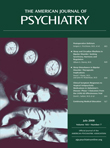Tricyclic Antidepressant Immunoassays May Reflect Quetiapine Adherence
To the Editor: As part of an ongoing treatment study of co-occurring bipolar mania and cannabis abuse in adolescents, we obtained bimonthly urine toxicology screens using the Status DS immunoassay. We found that the first five subjects initially tested negative for tricyclic antidepressants (TCAs), but all five tested positive after being treated with topiramate or placebo and quetiapine. All of the patients denied using TCAs but were forthcoming regarding their drug use. A quetiapine trough blood level was obtained the same morning that urine toxicology screens were performed, and the results paralleled TCA toxicology findings (i.e., when subjects showed quetiapine in their serum [5.1–85 ng/ml], they tested positive for TCAs). However, when two of the subjects were nonadherent to their medications and their quetiapine levels were undetectable, their toxicology screens were negative for TCAs. After these two patients were encouraged to take their medications and had detectable quetiapine levels, they once again tested positive for TCAs.
The structure of quetiapine is similar to that of TCAs (both contain a similar tricyclic framework), and there have been two prior case reports in the literature that noted false positives for TCAs in adult patients who were receiving quetiapine treatment (1 , 2) . Three in vitro studies (1 – 3) found false positive TCA results in some immunoassays using concentrations as low as 160 ng/ml of quetiapine. To our knowledge, there have been no prior reports of cannabis use or topiramate use causing false positives for TCAs. Therefore, we concluded that treatment with quetiapine was the cause of the positive TCA toxicology screens in our subjects, which occurred even at levels close to the detection threshold (as low as 5.1 ng/ml). Doses of quetiapine ranged from 300–600 mg, and there was a high variability in serum levels between subjects for a specific dose of quetiapine. These data are consistent with prior research that reported only modest to no correlation between dose and serum concentration with high intersubject variability and no correlation with therapeutic effectiveness (4 , 5) . Adolescents with bipolar disorder are poorly adherent to medications. Therefore, qualitative measures of quetiapine may be useful to determine whether patients are medication adherent. Our findings suggest that certain immunoassays for TCAs are useful as a qualitative test for quetiapine adherence and may avoid the need for more expensive serum level tests. Nevertheless, physicians should be aware of this potential cross-reactivity in patients being treated with quetiapine.
1. Sloan KL, Haver VM, Saxon AJ: Quetiapine and false-positive urine drug testing for tricyclic antidepressants. Am J Psychiatry 2000; 157:148–149Google Scholar
2. Hendrickson RG, Morocco AP: Quetiapine cross-reactivity among three tricyclic antidepressant immunoassays. J Toxicol Clin Toxicol 2003; 41:105–108Google Scholar
3. Caraveti EM, Juenke JM, Crouch BI, Anderson KT: Quetiapine cross-reactivity with plasma tricyclic antidepressant immunoassays. Ann Pharmacother 2005; 39:1446–1449Google Scholar
4. Schwarz MJ: Therapeutic drug monitoring of quetiapine and its major metabolites quetiapine-sulfoxide and 7-hydroxy-quetiapine. Eur Psychiatry 2005; 20(suppl 1):S209Google Scholar
5. Kohnlein O, Lutz R, Schmau M, Messter T: Determining serum concentrations of the modern antipsychotic quetiapine: clinical relevance in therapeutic drug monitoring. Psychiatrische Praxis 2004; 31:S175–S177Google Scholar



